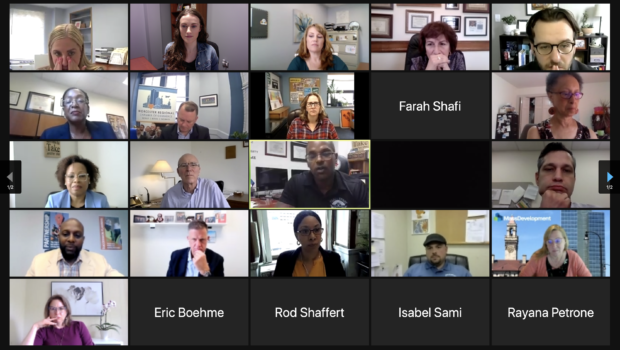DAY ONE:
Chamber Kicks Off Annual Game Changers Conference with Awards, Keynote
The Worcester Regional Chamber of Commerce kicked off their 2021 Game Changers Conference & Expo by honoring five local businesses, organizations, and individuals with Game Changer Awards and hearing from an opening keynote speaker.
What was a half-day, in-person conference pre-pandemic is being held virtually over Zoom for the second year in a row as a four-day mini-series. Now in its sixth year under the Game Changers brand, the Chamber’s annual business conference typically brings together members of the Central Massachusetts business community to learn about local innovations and business opportunities, hear keynote speakers, and network with other professionals.
This year’s conference theme, “Planning for an Equitable Future: Economy, Justice, and Education,” was organized in response to the racial reckoning and calls for change taking place across our country over the last year, reignited by the death of George Floyd and several other Black Americans. This 2021 theme builds upon the 2020 conference theme, “Not Business as Usual,” which explored how the region’s business community could work toward fostering a more diverse workforce and providing opportunities for diverse groups of people.
Similarly, discussions amongst keynote speakers, panelists, awardees, and participants in 2021 are centered around diversity and inclusion in the workforce, but they are also designed to extend the conversation beyond the office walls to examine efforts toward equity in other facets of everyday life: in the city, schools, health care systems, and more.
The four-day conference opened the morning of Monday, June 14 with recognition of this year’s five Game Changer Award recipients. In his remarks, Worcester Chamber President and CEO Timothy Murray said the award winners are “engineering change, creating community, and helping propel Worcester forward, especially as we emerge from some of the most challenging times we’ve ever witnessed.”
Mr. Murray was accompanied by Elizabeth Harnois, public relations specialist at Digital Federal Credit Union (DCU), to present this year’s awards virtually. The awardees were as follows: Dr. Mattie Castiel, the City of Worcester’s Commissioner of Health and Human Services, for her commitment to providing equitable access to COVID-19 testing and vaccines as well as other resources; biopharmaceutical company AbbVie for their company’s leadership in DE&I efforts and their new internship/scholarship program for Worcester Public School students; Fred Taylor, new president of the Worcester branch of the NAACP, for his leadership in diverse hiring and advocacy for underserved communities; both Worcester State University and Quinsigamond Community College for their collaboration on the 100 Males to College program; and Tocci Building Corporation for their hiring of a diverse workforce on the Courthouse Lofts construction project.
Described as “catalysts for change” by the Chamber, several of the 2021 Game Changer Award recipients expressed gratitude for the recognition as a Game Changer. “I always wonder what the impact of my work has been. The fact that this award is called the ‘Game Changer’ means that someone has noticed — and for this, I am grateful and honored,” said Dr. Castiel upon accepting her award. “I thank you for giving me the ability to appreciate that I have made some positive changes in our community, and I will let that be the force that continues to push me forward to positive change for all who live and work in Worcester.”
Speaking on behalf of Worcester State University, President Barry Maloney said, “Those students who are part of the 100 Males to College program […] are having their talents unlocked that we know they already possess — and this is the true Game Changing work that we’re trying to do is making sure everyone has an equal opportunity moving forward.”
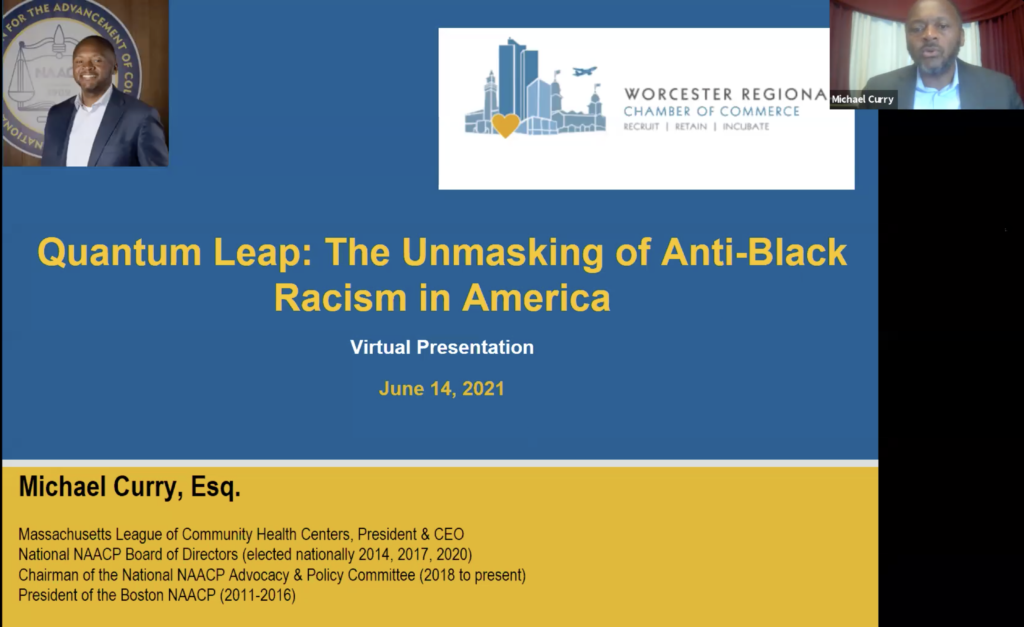
Michael Curry, president & CEO of Massachusetts League of Community Health Centers, presents his keynote address.
Following the awards ceremony portion of the day, President and CEO of Massachusetts League of Community Health Centers, Michael Curry, addressed attendees on the call with an opening keynote about the history of racial inequities in the U.S. The presentation, entitled, “Quantum Leap: The Unmasking of Anti-Black Racism in America,” took a deep dive into the long standing racial inequalities and injustices across the country which have historically impacted the Black community and continue to do so today.
Throughout the 50-minute speech, Mr. Curry continually asked participants to “take a Quantum Leap with [him]” and work to connect the dots of these inequalities and injustices by looking closely at a collection of historical facts.
Part of his presentation focused on what data show about how the COVID-19 pandemic has disproportionately impacted communities of color in the U.S. Citing the higher rates of death and infection among Black and brown communities, Mr. Curry said, “This disease was not born equitably across neighborhoods, across zip codes. It ravaged many of our immigrant, Black, and brown communities.”
Discussing how the coronavirus crisis only exacerbated and underscored existing societal issues, Mr. Curry said, “If this pandemic made us realize anything, it’s that we’re all interconnected […] We have to start seeing this context and really stepping up and showing that we can change this society and undo the inequities of the past.”
Prior to working at the Mass League, Mr. Curry spent 16 years at Blue Cross Blue Shield of Massachusetts, most of that time as Senior Policy Advisor in the Corporate Affairs Division. He served on the health care transition teams for Gov. Deval Patrick and Boston Mayor Marty Walsh, and was involved in the passage of Massachusetts Health Reform and the Affordable Care Act. He was also previously President of the Boston Branch of the NAACP and has more than twenty years of dedicated service to the NAACP on the city, state-area conference, and national levels.
Presented by AllWays Health Partners, the 2021 Game Changers Business Conference and Expo is also sponsored at the corporate level by Bowditch & Dewey, Tocci Building Corporation, and UniBank. The Game Changer Awards were sponsored by DCU, and the opening keynote was sponsored by Saint Vincent Hospital. More information about the conference can be found online at gamechangersexpo.com, where registration is also still open for the rest of the week’s conference sessions.
Dominique Goyette-Connerty is director of communications for the Worcester Chamber. She can be reached by email here.
Read local news coverage of day one of the conference by The Telegram & Gazette here.
DAY TWO:
Panelists Discuss Worcester’s Equity Agenda
Worcester, the second-largest city in New England with 185,000 residents, is home to people from a variety of different backgrounds. As a rapidly advancing city with such a diverse population, it’s crucial that the municipal government and other leaders are acting in everyone’s best interests, ensuring no one gets left behind.
During the second day of the Worcester Regional Chamber of Commerce’s annual Game Changers Business Conference and Expo, panelists discussed diverse and equitable initiatives already in place in the city’s health care systems, schools, and workforce. They also talked about the need for new or additional initiatives as the community continues to strive for equal and equitable access.
The panel, “Worcester’s Equity Agenda,” consisted of Dr. Mattie Castiel, the City of Worcester’s commissioner of health and human services; Ryan Flynn, the Massachusetts Business Alliance for Education’s director of affiliate network growth & strategy; Fred Taylor, president of the Worcester branch of the NAACP; and Stephanie Williams, Worcester’s chief diversity officer. The panel was moderated by Stacey Luster, general counsel and assistant to the president for employment and equal opportunity at Worcester State University.
According to data presented by Dr. Castiel, the pandemic has disproportionately impacted communities of color in the city. Overall, 12.3% of Worcester’s total population has been infected with COVID-19. However, 15.5% of the Hispanic or Latino population and 11.6% of the Black or African American population has had the virus, whereas only 9.5% of the city’s white population and 8.5% of the Asian population have been infected.
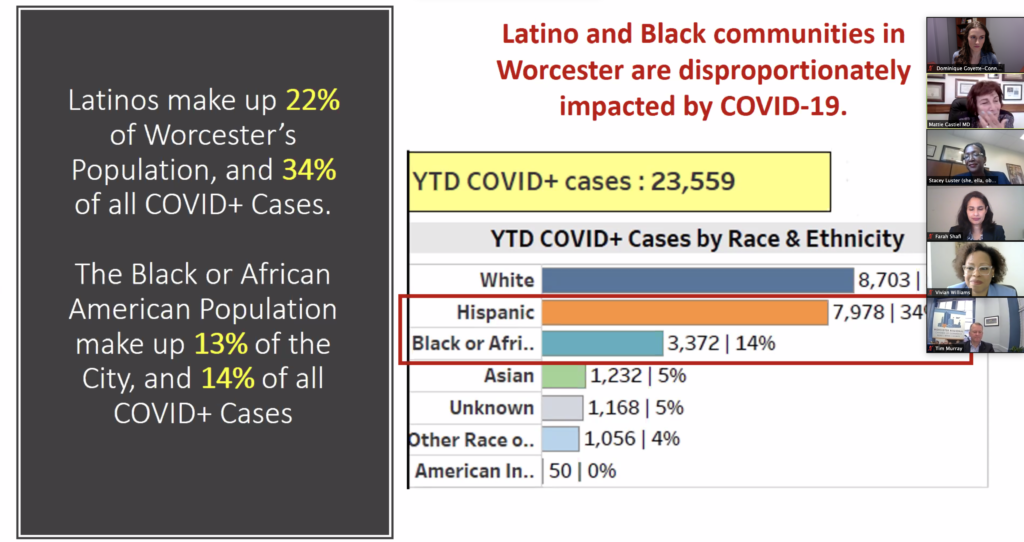
Dr. Mattie Castiel, commissioner of health & human services for the City of Worcester, presents on Tuesday’s panel.
In anticipation of health care disparities like these, the City of Worcester formed the COVID-19 Equity Taskforce to ensure all communities had equitable access to coronavirus testing, resources and information, and vaccinations through mobile vaccine clinics. When discussing the taskforce, Dr. Castiel said, “Most of you probably talk about, ‘What are some of the positive things that have happened through COVID,’ and it’s truly been the collaboration of different organizations to meet the needs of our community.” With more than 22 organizations and 56 stakeholders involved in the taskforce, “it involved a lot of people from the community to be part of the process, because we can’t do anything without the community having a voice,” said Dr. Castiel.
And issues with inequitable health care weren’t the only disparities the pandemic shed a light on. In his portion of the panel discussion, Mr. Flynn talked about differences in education that Black and Latino students face.
Even prior to the coronavirus pandemic, Mr. Flynn said students of color were underserved when it came to education. With just less than 50% of white students performing at or above grade level in subjects such as math and English language arts, that number drastically drops for students of color, with only 15% of Black students and 20% of Latino students doing the same.
The pandemic only exacerbated this already-existing problem, according to Mr. Flynn. “School districts that are majority white, about 80% of students had at least some time in the classroom in a hybrid or totally in-person environment. If you flip that to school districts that are majority students of color — including Worcester and most other gateway cities — it was about 80% of students had only the option of remote learning.”
Disruptions to learning aren’t anything new, but Mr. Flynn said the impact of the lost time in the classroom is not going to disappear. “We know from previous disruptions to learning […] that these disruptions stick with students for the rest of their lives,” he said. “We recognize the seriousness of the situation we are in and there’s broad recognition that something needs to happen […] parents are consistently saying that they want bold change at this particular point in time.”
He also discussed the long-term effects the pandemic could have on the economy in the future if actions are not taken now in assisting students. Citing an estimation by the Wharton School of Business at the University of Pennsylvania that in 2050, if the impact of the pandemic is not remediated, the United States could take a 3.5% hit to its national GDP, Mr. Flynn calls it, “Concerning, first and foremost.”
The third panelist to speak during Tuesday’s session was Fred Taylor, not only as president of NAACP Worcester, but also in his capacity as chair of the city’s Construction Diversity Monitoring Committee. Mr. Taylor led a discussion on diversity gaps in the workforce, specifically in the construction industry, stating that “the construction industry has a problematic history that persists today in not hiring Black, brown people, and women.”
Mr. Taylor said the work the Worcester Community Labor Coalition and Worcester Jobs Fund does in assisting marginalized groups with getting careers is important as they continue to recruit residents for local job opportunities. He also commended the City of Worcester for taking the lead on committing to hiring workers of diverse backgrounds on any city-funded projects, but acknowledged that there is still more to be done in this area.
When it comes to making sure the city’s diverse population is better represented and more included in the workforce, Mr. Taylor stated that all business owners have both the responsibility and opportunity to make a change. “I challenge you, each one of you, to join me and to join the City of Worcester in being an agent of change.”
To conclude, Chief Diversity Officer Stephanie Williams spoke about city hall’s efforts to make Worcester a more equitable place to live, work, and do business. Ms. Williams is tasked with supporting minority- and women-owned businesses and helping them thrive, but her main duty is leading the city manager’s diversity agenda. In February 2021, City Manager Edward M. Augustus, Jr. signed an executive order aimed at addressing systemic racism and police reform within the city. Of the executive order and the city’s ongoing efforts, Ms. Williams said, “Now is really the time with us creating a new normal around COVID, around social and political unrest where we can implement policy […] that drive larger systemic change.”
The 2021 Game Changers conference is being presented by AllWays Health Partners. Tuesday’s session was sponsored by Health New England.
Rayana Petrone is a Lasell University intern at the Chamber.
Read local news coverage of day two of the conference by The Telegram & Gazette here.
DAY THREE:
Panelists Discuss the Role of Employers in an Equitable Recovery
Continuing the theme of “Planning for an Equitable Future: Economy, Justice, and Education,” during day three of the Worcester Regional Chamber of Commerce’s 2021 Game Changers Conference & Expo, panelists discussed the role employers play in an equitable recovery. This panel was arranged to explore what employers can do to diminish racial and opportunity gaps in their companies and organizations. Moderated by Bonnie Walker, director of equity and inclusion at Worcester Academy, the four panelists — Katie Crockett, Angela Dixon, Celia Richa, and Derrick Kiser — were asked to share how they have worked towards diversity, equity, and inclusion in their companies and organizations.
To open the discussion, President of Lamoureux Pagano & Associates Architects Katie Crockett was first asked, “What can employers do beyond looking internally at their hiring policies; what external opportunities are available for further equity for employees?” Ms. Crockett began by expressing how architecture has historically been a predominantly white and male industry. She said there are many roadblocks that prevent more women and BIPOC (Black and Indigenous People of Color) from entering the industry as it takes several years and high costs to complete the higher education required to become a registered architect.
Ms. Crockett added that getting children interested in the architectural field is challenging because children aren’t as exposed to it as a career option. To combat this challenge, Lamoureux Pagano & Associates Architects offers two days of paid community service to their staff members annually to present at schools and groups such as Girls Inc. and Girl Scouts in hopes that with more exposure to architecture, more youth may be interested in pursuing this field as adults.
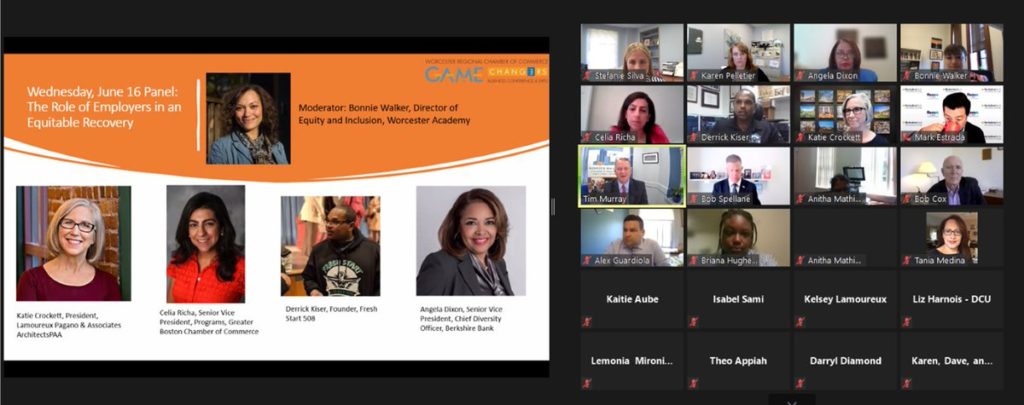
Panelists discuss the role employers play in an equitable recovery during day three of the Chamber’s annual Game Changers conference.
Senior Vice President and Chief Diversity Officer at Berkshire Bank, Angela Dixon, fielded the question, “How do we better attract and support women, BIPOC, LGBTQIA, and other underrepresented and traditionally marginalized groups?” Ms. Dixon said that for companies to attract a more diverse workforce, they must look at themselves to see what is holding prospective employees back from working in particular industries and companies. She expressed that prospective employees want to work for companies that align with their values. One solution Ms. Dixon suggested to recruit and retain diverse candidates is to provide employee resource groups. She said these groups could create a safe space for employees to discuss critical conversations revolving around race, gender, and other factors which affect the livelihood of employees in and out of the workspace. Ms. Dixon said these might not only create important discussions between employees, but also have the ability to foster a sense of community and trust within the workplace.
Senior Vice President of the Greater Boston Chamber of Commerce Celia Richa was asked, “What can employers do beyond looking internally at their hiring policies; what external opportunities are available for further equity for employees?” She responded that although it is important for companies to look for and promote more diverse candidates, companies should also think about where they spend their money, specifically when it comes to procurement. “Whoever is in charge of buying should be working hand-in-hand with your chief diversity officer and HR personnel […] to make sure that spending is a part of your DEI (diversity, equity, inclusion) goals.” Ms. Richa explained that companies typically focus their spending on efficiency, which might include multi-year contracts and limiting the number of vendors to ensure low costs, but that “directly counters the principles of supplier diversity,” she said. Echoing this sentiment, Ms. Walker added, “How and where you spend your money tells a lot about who you are. It shows what you care about and what your values are.”
Founder of Fresh Start 508, Derrick Kiser, was the final panelist and was posed with the question, “How do we transform ourselves as well as our practices to become more equity centered? Whose skills, values, and experiences do we appreciate and celebrate?” Mr. Kiser said, “America wasn’t designed with Black in mind in regard to equal opportunity and equal justice.” He said upon the creation of the U.S. Constitution, people of color were viewed and treated as property, and even as they slowly gained more human rights over time, the system that perpetuates racism prevailed. In order to change this system in the workplace, he believes company and industry leaders need to “look in the mirror” to see how they may unknowingly be contributing to this.
One way Mr. Kiser has used his organization to mitigate this program is by working with local companies to provide training and jobs to formerly incarcerated individuals. By giving those in this community a chance to train and work in fulfilling occupations, these business owners are helping create a brighter pathway for those who were formerly incarcerated.
Ms. Walker wrapped up day three of the conference by saying how important it is to ask questions when having critical conversations about diversity, equity, and inclusion. “There are so many questions that we have to continue to ask ourselves to get to the right answers,” she said.
Wednesday’s panel session was sponsored by Clark University Graduate Studies. The 2021 conference is being presented by AllWays Health Partners.
Kate Aube is a Fitchburg State University intern at the Chamber.
Read local news coverage of day three of the conference by The Telegram & Gazette here.
DAY FOUR: Judge Georges Stresses Importance of Giving People a Chance at Final Day of Game Changers
The importance of giving someone a chance was the overarching theme of the final day of the Worcester Regional Chamber of Commerce’s Game Changers Business Conference and Expo. The four-day event concluded with a keynote address from Judge Serge Georges, Jr. of the Massachusetts Supreme Judicial Court.
Justice Georges recalled when the Chamber’s own Vice President of Government Affairs and Public Policy Alex Guardiola told the judge about the challenges he faced growing up Mexican in the United States and as the son of a single parent. During that conversation, Justice Georges said Mr. Guardiola expressed gratitude for having a chance to make something of himself despite these challenges. Justice Georges said Mr. Guardiola’s personal story was just one real world example of how giving people a chance in life could go a long way.
“The zoomed out 3,000-foot view of diversity and inclusion can, in many ways, […] distill down […] to just giving people a chance. We can only go so far before we need somebody to say ‘yes’ to us,” said Justice Georges. According to him, everyone has been given a chance to further themselves, whether they recognize it or not, and giving that gift back to someone else is the least we can do.
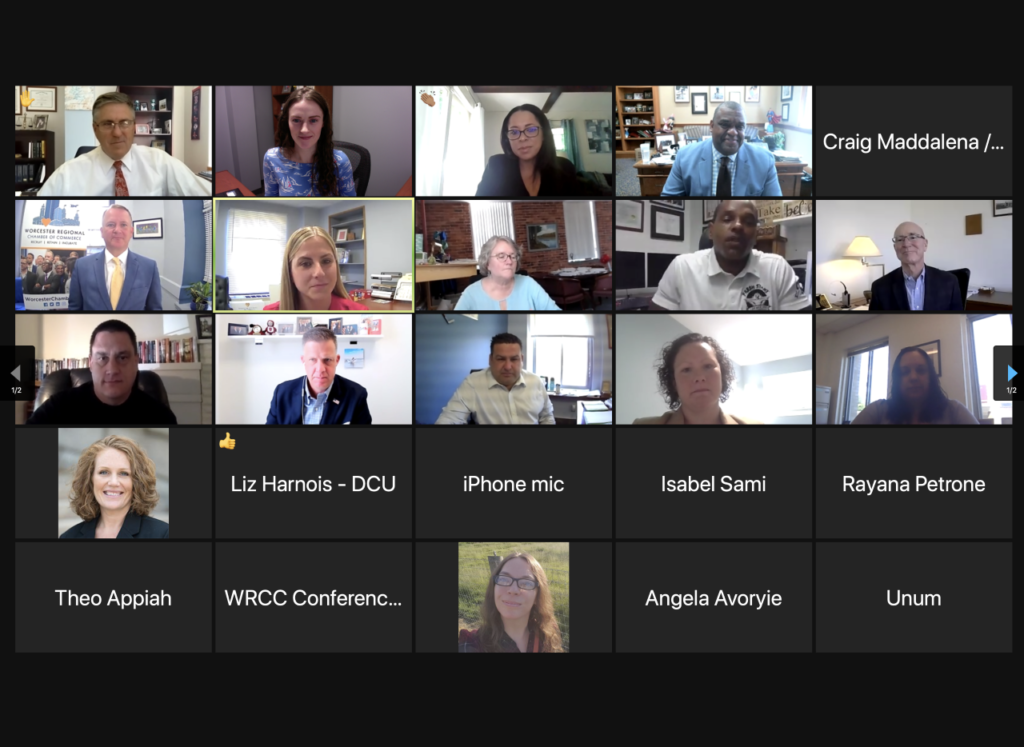
The audience tunes in to watch Justice Georges deliver his keynote address on the importance of giving people a chance.
Justice Georges discussed the role in which business owners and community leaders have in giving someone a chance, and the importance of this. “You have so much power in your life to change lives. You can make a dent in this world by believing in someone, particularly those of us that don’t look like you,” said Justice Georges.
Giving someone a chance isn’t always as complicated as one might assume, Justice Georges said. He referred to chances as “gifts,” and said oftentimes, people believe you need money to give gifts, but that is not the case here. He believes what is crucial in giving someone the gift of a chance is remaining humble and believing that you have already had enough. Giving the gift of a chance to someone requires you believing in them and their ability to take the opportunity and thrive, according to Justice Georges. “From this abundant place, you can give a chance to someone who has waited their entire life to meet you and be given your gift,” he said.
To conclude his address, Justice Georges reiterated the importance of taking chances on people. He reminded the audience that failure is going to happen in every aspect of life, but mistakes made along the way only allow for growth. If a chance is given to someone deserving, he said the recipient is likely to pay it forward, which is only going to allow for more future opportunities for others. He ended his keynote by saying, “Let’s keep the world prospering and help move along prosperity for all, inclusion for all, equity for all, and pay the chances we are given forward, […] the recipients of your opportunities will seek every way that they can to repay you by paying it forward,” said Justice Georges. “Learn to appreciate the possibility that new relationships bring good […] Embrace new relationships even though you may be anxious because you are entering into unfamiliar territory. Be ready to learn, be ready to change, be ready for challenge.”
The Chamber’s 2021 Game Changers Business Conference & Expo was presented by AllWays Health Partners with supporting corporate sponsorships from Bowditch & Dewey, Tocci Building Corp., and UniBank. Thursday’s session was sponsored by The Hanover Insurance Group.
Rayana Petrone is a Lasell University intern at the Chamber.
Read local news coverage of day four of the conference by The Telegram & Gazette here.



